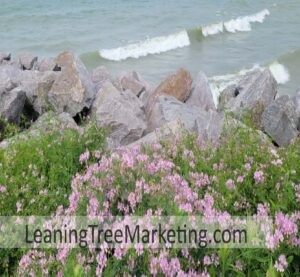Organic simply means “non-paid” and “natural” search results. The term can apply to local searches, such as in Google Maps. It can also apply to National searches, such as on Google or Bing. In any scenario, organic search results are never paid for. The search engine has algorithms that, along with your website’s SEO and content, determine what websites appear for each search query. When organic results appear, they typically fall beneath the paid results. Unless you want to pay lots of money for paid ads, then organic is the way to go. Most businesses do hire an SEO digital strategist to ensure that the potential of organic search results is maximized.
Leaning Tree Marketing knows just what to do.
Local Organic Search
Local Organic SEO is sometimes referred to as “local SEO.” The main goal of Local SEO on Google is to get into the local listing packs on Google Maps. You can achieve this by building local signals around specific brick-and-mortar offices or store locations. (You must have a physical location to take advantage of local SEO.) Most people begin by establishing, verifying, and completing a Google Business Profile. (Some businesses stop there.) But truly, there are local SEO strategies that most businesses wouldn’t know on their own. These strategies involve website strategies such as landing pages, on-page SEO, and many off-page elements as well. Lastly, local SEO has a geographical/proximity and a physical component that makes it different than organic SEO. If you have more than one storefront or office, there are also ways to optimize local search for multiple business locations.
Organic Search
Organic SEO doesn’t require a brick or mortar business, although it can be influenced by location. When you are working on natural organic results for your business, the goal is to rank as high as you can for specific keywords and search terms. This will take some well-performing, refined content, that matches what people are searching for. (User Intent) Of course to do this, there is a huge focus on your website. But, we’re not only talking about the part of the website visitors read. The backend of your website is equally, if not more important. Be sure to address technical SEO including core web vitals, and building links. (Gaining authority in your field should be an ongoing dedication.) This is no easy task. For a competitive business, look for professional help who is experienced in these areas.
Talking To Search Engines
When you do a search on Google, for example, the results which are displayed are not at all by “chance.” There are literally thousands of different factors that search engines use to rank websites. Because most people don’t scroll page page one of the results, it’s important to have a presence there… on page one. Organic SEO has a lot to do with talking to search engines so that they match your website content to search queries. If your web page makes the cut, then your sales go up. It’s that easy to explain, but much more difficult to achieve.
SEO Advice For Your Business
Your top priority should be organic rankings. Everything comes AFTER that has been established. The three C’s to keep in mind are: CONTENT, CODE and CREDIBILITY. When you have the right SEO professionals in place, you can be assured that the most important things are covered. With the right people, your website will be technically sound, and maintained to stay that way. The content on your website will be both user-friendly as much as it is search engine friendly. The content will represent your brand, services and products. Off-site touchpoints of a customers journey will be directed back to your website. Over time, credibility will be built through reviews, backlinks and referrals. There are a ton of other things to consider, but this is SEO advice in a few sentences.
An SEO expert can have a big impact on your business. Fill out this contact form to speak to a professional SEO who can help get you started, organized, and optimized for search engine results.








